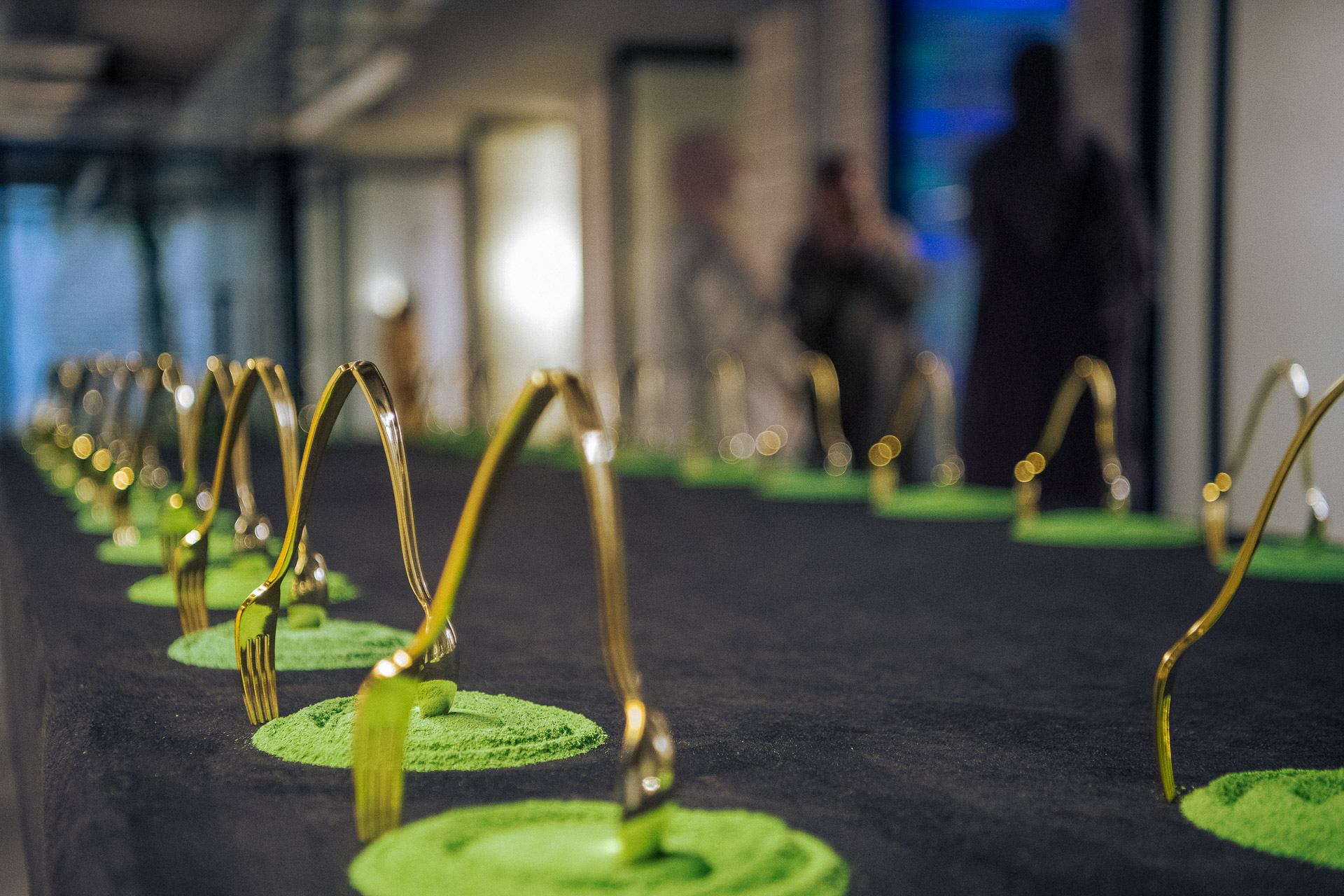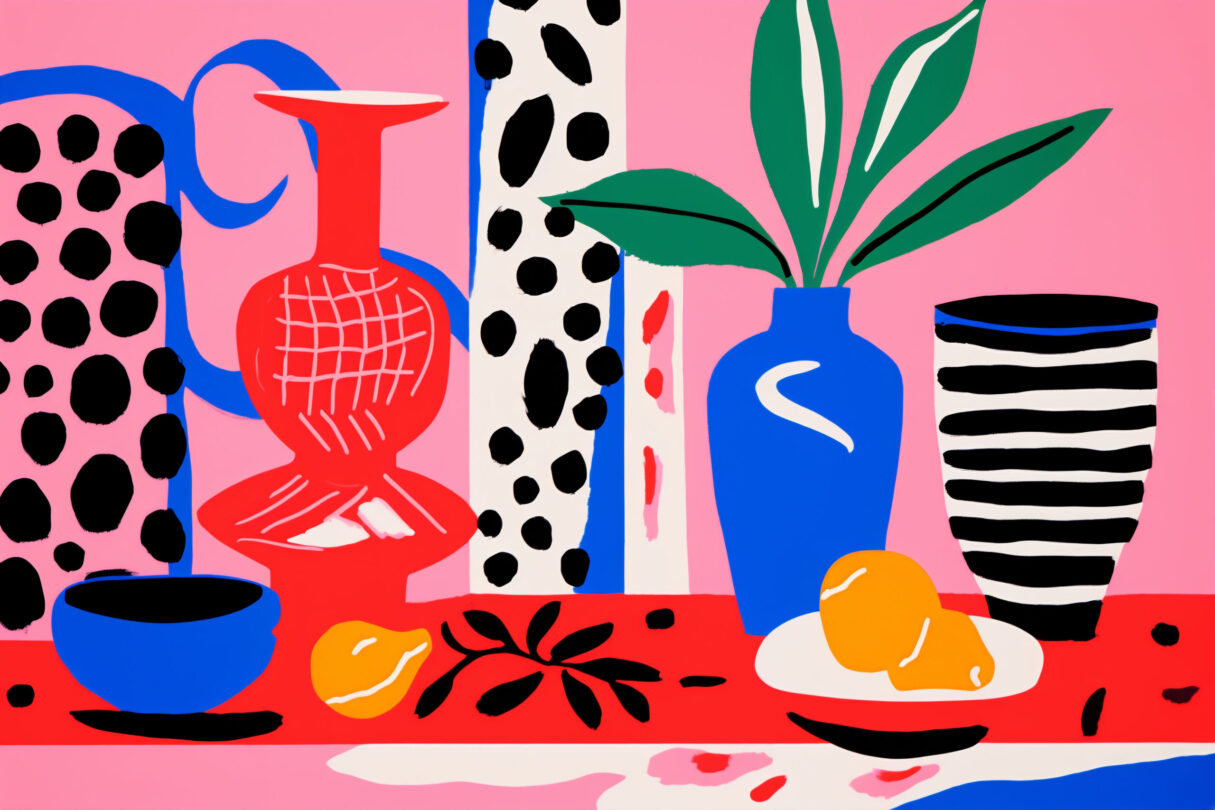The exhibition entitled Next Wave gathers works and projects by a new generation of Saudi artists dealing with issues such as the environment, technology critique, determinism, the sense of belonging, coming to terms with memories, and the encounter with urban spaces. The presented works mark the culmination point of the intensive development and engagement of the stipend recipients of the years 2021 and 2022. They bring together the following practice-oriented promotion programs: the Misk Art Institute’s Masaha Residency Program and the BAI Residency Program run by the Berlin Art Institute – all of which emphasize the importance of critical practice and research.
The Artists:
Between us and nature
Abdulmohsen Albinali’s (*1988 in Saudi Arabia, lives and works in London) multifaceted work is rooted in the garden. He is an interdisciplinary artist who makes use of recycled materials and narratives, with which he invites the viewers to reflect on how our natural environment stimulates human inventiveness and creativity, thus contributing, over time, to the formation of complex social structures and spiritual beliefs.
Does the discourse imbue our understanding of and interaction with nature? Albinali invites us to think about these issues and even goes as far as calling into question the distinction between “us” and “nature.”

Death in the digital Age
By taking a multisensory approach and in order to present her research, Abeer Sultan (*1999 in Saudi Arabia, lives and works in Riyadh) has developed her own visual symbolism that conveys global experiences with death. Influenced by ancient Egyptian, Mediterranean, and Arab rituals having to do with death, Sultan initiated a process in which she combines new symbols with traditional symbolism. With her video piece entitled Al Bidaya (The Beginning), she invites the viewers to raise questions about the meaning of death in the digital age.

I don’t eat you…
Bashaer Hawsawi (*1992 in Saudi Arabia, lives and works in Mecca and Jeddah, Saudi Arabia) presents an installation entitled Eat Sand; I don’t Eat You, her art deals with the paradox of social inequality. From the cakes made of mud that the Haitians had to eat after the earthquake in 2010 to the lush green tea farms in China: Hawsawi prompts the viewers to think about the state of affairs, which has always been contradictory.
Personal or Collective History
Fatma Abdulhadi’s (*1988 in Saudi Arabia, lives and works in Riyadh) work reflects on transformation and collectivity that detaches itself from singular representations. The temporary validity of identity is a fundamental component of her art. Printing processes allow her to examine and question these aspects in more detail. What does it mean to be at home? What is belonging? Is it the retracing of personal or collective history?
Ancestoral Tradition
Hana Almilli (*1996 in Saudi Arabia, lives and works in Riyadh) interweaves strands through her work (Through the earth, I come back home) that can be traced back to her ancestors. In her installation, she uses old photographs as well as woven works and traditional dying techniques, employing materials from the ground on which her ancestors once stood—and on which the artist now stands.

Nada Alturki
The journalist and writer focuses on social constructions and societal problems:
“The art world, as we know it, is in the midst of a revolution. As we are now rediscovering lost art and paying attention to emerging artists globally, the expansion of the arts and its shift in focus is inevitable. It creates a world where art and artists alike are not only seen as names and pieces on a wall, but as narratives that provoke discourse, questions, and social interactions—and here is where the true value of art lies. As we begin to question our access to some narratives over others, we simultaneously begin to bridge the gap between our cultures, allowing the truth of modernity to determine how we interact with the world around us.”
Nada Alturki, from: A Letter from the Writer in Residence, exhibition catalog Next Wave, 2022.
The Structure of Language
Sara Khalid’s (*1996 in Saudi Arabia, lives and works in Dhahran, Saudi Arabia) work sheds light on the cultural bias of technology that results from the dominance of one language over the others. Her work is an attempt to imagine a new future in which algorithms and technical devices can generate stories and poems and the code of the digital world itself is Arabic. Through a cross-disciplinary combination of materiality and research, her work encourages us to reflect upon the subtle and at once pervasive power that the structure of language possesses.
A Prescribed Lifestyle
Yousef Almana (*1997 in Saudi Arabia, lives and works in Philadelphia, USA) sees an expression of the fate of the city in Riyadh’s architecture. He claims that the cityscape of Almalaz, a district of Riyadh, is a direct reinterpretation of Constantinos A. Doxiadi’s Ekistics. Almana proposes that this architectural system imported from abroad has influenced the city’s population in a way that is not easy to grasp. Furthermore, his installation with the title Perpetual Monochrome suggests that our life, our decisions, and our relationships are determined—the permanent monotony of a prescribed lifestyle.

“Art was always seen as an object of possession only for the elite. As the motivation for acquiring art pieces becomes less about financial investment and more inclined toward cultural significance and emotional evocation, the arts are slowly becoming more accessible and transparent. Furthermore, it becomes a key tool in connecting cultures and communities, creating a more diverse, transparent, and accessible market. The primary elements of artwork become less about aesthetics and more about the research and documentation of the process itself. It is essential more than ever to catalog the evolution of the global art scene and archive this historic contemporary moment. Here, the art writer’s role becomes pivotal to highlighting the efforts made by artists across the globe and a means to explore the inclusivity, intersectionality, and cultural progression of the art at hand.”
Nada Alturki, from: A Letter from the Writer in Residence, exhibition catalog Next Wave, 2022.

Dark & Vivid Colours
The work of Ziad Kaki (*1993 in Switzerland, lives and works in London) focuses on psychological tension and bodily distortions. Inspired by classical mythology and museum exhibits, the sculptural elements of his paintings, along with their dark and vivid colors, give rise to the sense of an ahistorical, visual contradiction.
Misk Art Institue:
The Misk Art Institute was founded in Riyadh, Saudi Arabia, in 2017 and is a non-profit organization that sees its mission in strengthening the local and regional creative community and promoting the appreciation of art and culture. The Institute is committed to facilitating the access to art and encourages up-and-coming artists to unfold their creativity in a network of support, expertise and further education to tap potentials and upgrade the country’s art infrastructure. It offers exhibitions, publications and possibilities for creative development as well as a residency program—in addition to the largest promotion program of its kind in the region: the Misk Art Grant. The Misk Art Institute also organizes the annual Misk Art Week.
Berlin Art Institute:
The Berlin Art Institute promotes artistic production, discourse, mediation, and research and is dedicated to further and advanced training in a contemporary context through its education programs. The BAI seeks intercultural exchange and a lively, cross-border dialog in international cooperation projects and understands itself as an actor in the field of art, creativity and education. The BAI was founded in 2015 by the artists Stephanie Jünemann and is located in the building complex 404 of the Motorwerk Berlin at the Industriebahn in Berlin-Weißensee, which also houses numerous studios, small business enterprises and an event hall.
With: Abdulmohsen Albinali, Abeer Sultan, Bashaer Hawsawi, Fatma Abdulhadi, Hana Almilli, Sara Khalid, Yousef Almana, Ziad Kaki, Nada Alturki
From: September 14 – October 14, 2022
Galerie der Neuen Schule für Fotografie, Brunnenstraße 188-190, 10119 Berlin
The show retraces the encounter of the stipend recipients in the exhibition space. The title of the exhibition, Next Wave, alludes to avant-garde and uncharted territory. The works and projects by the artists are at the center of the exhibition, with research and documentation playing a crucial role.
The exhibition is a collaboration between the Misk Art Institute and the Berlin Art Institute.



















#Dialogue
One response to “Next Wave @ Berlin Art Institute”
[…] A decisive part of Rasheed’s artistic research is dedicated to the challenge of hegemonic knowledge systems and the dissection of their inherently oppressive power structures. Her practices can be regarded as an invitation to viewers to learn and unlearn. As well as probing ways of how this process can be achieved in a collective setting. Rasheed’s work is characterized and informed by her engagement with local communities. She seeks to define a new collective and empowering mode of knowledge production, one that is oftentimes conceived and produced outside of the art institution.” […]